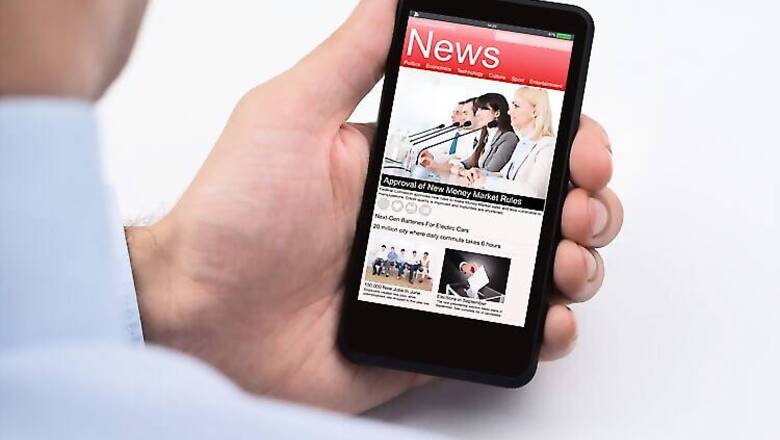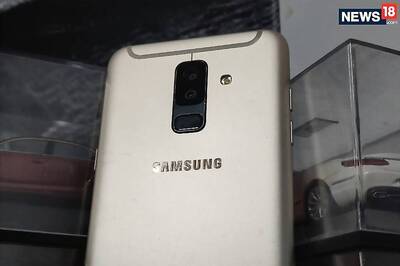
views
'The Future of News' is widely researched and explored among other aspects as how it can be monetised in the digital age: News is available for free on Internet except for paying the Internet Service Provider (ISP).
News has a 'noble value' unlike tube of syrup, or talcum powder. It has its critics for trivialising and tabloidisation of that noble product. Rolf Dobelli writes in The Art of Thinking Clearly, the international bestseller: "I would predict that turning your back on news will benefit you as much as purging any of the other ninety-eight flaws we have covered in the pages of this book. Kick that habit - completely. Instead, read long background articles and books. Yes, nothing beats books for understanding the world."
There is chance for news to reinvent itself if it's presented in an analytical format apart from presenting it in nano-form.
Internet & media:
Internet is increasingly impacting all spheres of life across the world. How widely, and how deeply it is impacting in each country and in each continent varies. But the fact is that the more and more number of people are getting connected to the Internet.
Developed countries (Western Europe including the island nation state of UK, USA, Canada, New Zealand, Australia), East Asian Tigers such as South Korea, Singapore, Taiwan are ahead of the rest of the world in Internet connectivity. While in the developing and under-developed countries the pace of Internet penetration is tardy, and fraught with multiple challenges: lack of access to mobile data (mobile phones without Internet), lack of purchasing power, and illiteracy.
The fact is that 'Right to Internet' is happening while at the same time other basic rights of citizens in some countries have to be met (housing, education, health). Internet.org is aiding the unconnected people but it is in a rudimentary stage.
Impact of Internet on media:
Technologies and innovations will have an impact on media. The news platforms are often the first ones to embrace them apart from the police and defence establishments. Telegraph, telephone, Dictaphone, short-hand (very few institutes teach it), computers, computers with Internet and now smartphones have impacted the press in many ways either in sourcing news and sending it to the newsrooms, and in disseminating it to the audience.
With Internet, another platform has emerged for the press: accessing news on Internet-connected devices such as computers, tablets, and mobile phones (smartphones). This is almost decimating the demand for physical newspapers, and magazines as is the case in the West, and also on television, as a result they are replicating their presence on online, and moreover Internet-only news platforms have emerged, and emerging at micro and macro level.
Choice to choose:
For a netizen, there is a plethora of choice to access news: also to customise news, to seek only that news that matter to oneself. News, in traditional sense, has had informational value, and also as the source for knowledge and build upon it to gain erudition. This enabled the reader to make informed decisions, and opt for reasonable and enriching choices.
With the arrival Internet, and increasing reach, news' future is at stake. For everything one has to know there is a website: Google, Wikipedia, dictionaries, encyclopedias… you name it, it is there not only in the format of text but also in multimedia formats. Among them the two most popular websites that have attracted the attention of the digital users are Facebook and Google.
Google:
Google is older than Facebook. Google started as a research project in 1995 but hit the Internet in 1998, and since then it has emerged as the leading search engine, and also as the browser. It almost the byword for many things on the net: Google is also a verb - google! For anything related to quotidian life users are googling: for a snippet of information, to find out about the local markets, what to see in a vicinity, about the bio of a person… and also for news! Accordingly, Google will lead the user to a website of its choice, ranked by it according to its preferences and marketing strategies.
It may not be surprising that some users are getting connected to Internet to be on Facebook! Founded in 2004, it is the most popular social media website. Facebook has more than 1.49 billion active billion users; if the unconnected people to Internet get access to it then it will touch 2 billion subscribers!
Facebook has a world there: being there also enables users to get news that matters, to get news that maybe of interest, to get news that has 'human interest', to get news that is worthwhile to know (informational value, or a speck of knowledge, or both).
Before Internet, the media organisations (newspapers, magazines, radio and television stations) were the gatekeepers for information and news). No more. Not in the 'digital age'.
On Internet, Google and Facebook have conquered swaths of lands across the cybersphere. Google and Facebook have the capacity to signpost their user to this site or that site often according to its choice.
Traditionally, newspapers and television channels have a large number of captive audiences. In 2013, Justin Osofsky, VP of Media Partnerships and Global Operations, wrote: 'Starting today for Facebook Pages of media organisations, we are beginning to test a new feature called "Stories to Share." Stories to Share makes it even easier for media sites to find the most engaging content they might want to post on Facebook. For instance, TIME can see suggestions of stories they have published to TIME.com but they have not yet shared to their Facebook fans." In May 2015, Facebook created a rut on its site to the leading publishers to publish their stories: Instant Articles. What next?
Facebook is aware of the importance of media organizations and about 'news media' consumers. And, it wants them to piggy ride on it! Its efforts have paid off now.
According to the analytics firm Parse.ly, from analysing the referral traffic to the 100 top news sites during May to July 2015, it found that Facebook is the leading website of the news referral traffic followed by Google though it was the leader a year ago peaking in the autumn of 2013.
Parse.ly found that 43 per cent of the referral traffic is witnessed on the social media websites with Facebook topping the list followed by Twitter the microblogging website; and 38 per cent came from the search engines topped by Google and followed by Yahoo.
The difference in driving the news referral traffic between Facebook (38.3%) and Google (35.8%) is not much but the race between the two is closely watched, and will continue to determine who is going to forge symbiotic relations with the established and emerging 'news media sites' and what else to innovate.
Facebook and Google will continue to dominate the online space, and have also emerged at par and 'above the media barons' on the socio-political ladder. Their power stems from the digital users using their platforms. They, the users, have empowered them! The media barons, media organisations, and political executives of nation states are approaching Facebook and Google!
(Kovuuri G Reddy is the author of 'Handbook of Journalism and Media: India, Bharat, Hindustan'; he specialized on Internet & Media, Internet & Society. He can be reached at [email protected])



















Comments
0 comment